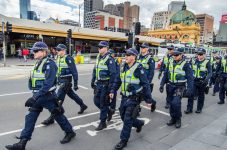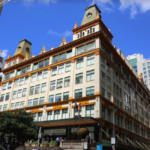Policemen Prey on Victims of Sexual Assault and Domestic Violence

Who would you call if you were a victim of unwelcome sexual contact?
For most people, the first thing that springs to mind is: ‘The police.’
But what happens when the person who is making the advances is a senior police officer – and your boss?
Sadly, this has been the experience of many young female police officers within the Victorian Police Force, according to a recent review by the Victorian Equal Opportunity and Human Rights Commission.
The revelation comes just weeks after a separate inquiry found that male Victorian police officers had ‘sexually preyed’ on vulnerable members of the community whom they were bound to protect – including victims of sexual abuse and domestic violence.
A Smear on the Force
The Independent Review into Sex Discrimination and Sexual Harassment, including Predatory Behaviour in Victoria Police, describes the experiences of countless women who were subjected to sexual harassment, including non-consensual sexual contact, by their male colleagues.
The Report was commissioned by the Chief Commissioner of Police, Graham Ashton, after numerous allegations were made regarding the conduct of certain officers.
5,000 police were surveyed – making it the largest workplace survey on sexual harassment ever conducted in the world. Of those who responded to the survey:
- 40% of women and 7% of men answered ‘yes’ to the question, ‘Have you ever personally experienced sexual harassment?’
- 1 in 5 women surveyed and 1 in 20 males surveyed said they had experienced harassment within Victoria Police that had started in the last five years;
- Two thirds of female respondents and over half of all male respondents had witnessed at least one instance of sexual harassment within the workplace in the past five years;
- Respondents reported that sexual harassment was most likely to occur in a station or office environment;
- The most common form of harassment was ‘sexually suggestive comments or jokes’;
- Female officers experienced higher rates of ‘unwelcome touching’ than those in the community; and
- Just under 2% of female respondents reported experiencing ‘actual or attempted rape or sexual assault’ by a colleague.
Those who had the courage to speak out were often left feeling dissatisfied with the outcome – in 22% of cases, there were no consequences for officers accused of harassment. In other cases, the officers were spoken to by their superiors, while others were simply shifted to another station. Only 5% of officers were dismissed.
One anonymous victim stated:
‘Our job as police is to investigate, if we treated victims of crime the same way we treat our own victims of sexual harassment then there would be public uproar! It is a pathetic and flawed system that has let down victim after victim…’
The horror stories of several female officers are contained in the report. One young female officer described being propositioned for sex by a married Leading Senior Constable while on patrol in a police car.
The woman stated that the senior constable told her that his wife did not mind if he had extramarital sex, before asking if she was the type of girl who would be up for it.
He then pulled over in a secluded area and pressed her for details about her sex life, touched her leg, made comments about oral sex, and started touching himself over his clothing.
Feeling scared and vulnerable, the young woman finally snapped and threatened to spray him with capsicum spray. The senior constable responded by telling her: ‘You don’t have to be a bitch about it,’ and drove back to the police station in silence.
Another woman described her experience on a work-related trip:
‘…The inspector was in the next room and calling that he was thinking of me and masturbating and ejaculating on the wall between our rooms. I was really frightened with all those guys with a gut full of grog.’
Others spoke of instances where they were touched inappropriately by senior officers:
‘I was talking in my office about daily work and was leaning over a filing cabinet and the Sergeant entered the office, walked around and past me and slapped me, hard, on the arse and said “Good morning.”’
Police Prey on Vulnerable Victims
Meanwhile, a separate inquiry has found that male officers of the Victorian Police Force preyed on members of the public, including victims of domestic violence and sexual assault.
The inquiry identified several police officers who had acted inappropriately in their duties, including one suburban officer who pursued a sexual relationship with a victim of domestic violence.
The same officer was later found to have harassed a number of his female colleagues – with one official describing him as a ‘serial offender.’
These incidents, together with the prevalence of sexual harrassment, have led some to label the Victorian Police Force as having a ‘culture of abuse,’ with many blaming a lack of accountability for allowing officers ‘to prey on, harass or discriminate against others.’
The toxic culture which permeates the force is especially dangerous given that victims of police abuse are generally vulnerable members of the public – or junior female officers who look up to their superiors.
Can This Culture be Changed?
The Review recommended a number of cultural changes – including that police receive ongoing training about human rights and the impact of sexual harassment and discrimination.
It also recommended the establishment of a redress scheme for victims of police harassment, as well as an external ‘safe space’ where victims can receive support and advice in confidence, together with effective communication strategies to support those who experienced sexual harassment and bullying in the workplace.
It also recommended that three advisory commands be established to implement educative reforms, advise the Chief Commander of developments, and inform the Executive Command of the progress of the recommendations.
Mr Ashton has promised to implement these recommendations, but says there is more to be done:
‘…Over the next few years, there will be many changes made to the work environment…The expectations of behaviour will be backed up by clear consequences for those who cannot change and adapt.’
It seems that the prevalence of sexual harassment and predatory conduct is another consequence of the force’s toxic culture and lack of accountability.






